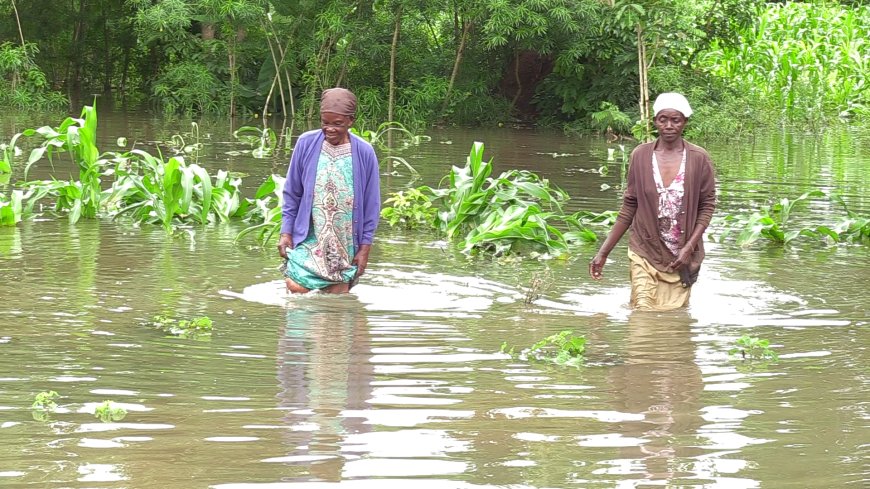How over 250 Budalang’i families in camp juggle between IDP lives and Waterborne disease

Busia
Wednesday, January 10, 2023
KNA by Absalom Namwalo
The unfolding environmental disasters brought about by the harsh effects of global climate change have for years impacted negatively on many lives of Budalang'i residents who have been perennial casualties of flooding effects.
Every year, whenever they see clouds in the sky it sounds like a drum beat for them to salvage a few items and respond to the usual song from the disaster committee “Move to higher grounds.”
For 4 years now over 250 families in the Bunyala sub-county according to Kenya Red Cross Society have ditched camp in the set-up of Internally Displaced Persons (IDP) camps on higher grounds to save their lives.
Being a common norm for them, the families have now strategized to juggle between the effects of harsh weather patterns and managing water-borne diseases emanating from flooded water.
With 80 percent of families in Budalang'i depending on water from open springs and untreated water sources like Lake Victoria and River Nzoia for domestic use, there has been an impending danger of waterborne disease which has led to losses of lives in the sub-county.
Bunyala floods victims led by Mr. Godfrey Wanjala expressed fear of loss of lives as a result of the disease outbreak as flooded water mixes with human wastes from toilets in homes and schools ending up in the lake and springs where most residents draw their water for use.
“For years, we have been trying to maneuver between treating water for use and making dykes to prevent backflow of water from Lake Victoria and River Nzoia,” said Wanjala.
“Families here are confused between consuming contaminated water and being swept away by flooded water,” he added.
According to Kenya Red Cross society, in the last two years, families in flood-prone areas in Busia, have witnessed a significant increase in diseases such as cholera and hepatitis B – both triggered by consumption of contaminated water.
A move that saw the Red Cross engage with the Busia media team, NGOs, and government agencies to sensitize and educate the communities in Busia on ensuring a comprehensive protection of water sources in an event that saw journalists partner with the Red Cross to distribute food to flood victims.
“Springs and river Nzoia serve as the main source of water in this region, but it is common practice for animals and human beings scooping from the same vessels pausing high risk of disease outbreak,” said Red Cross officials in Bunyala.
With leaders only aiding families in the camp with foodstuff and personal effects items, there has been little attention directed towards water treatment exposing families in the camp to greater risks.
“Flooding is devastating in every aspect: from property and infrastructure damage to loss of life and wider health impacts. As flooding becomes increasingly common for more people in a warming world, we look at its repercussions on human health,” noted Busia Women Rep Catherine Omanyo when she visited flood victims in the camp earlier this year.
According to the World Health Organization (WHO), Flooding is the most common natural disaster globally, affecting more than two billion people worldwide between 1998 and 2017 and with 49 percent of disasters worldwide associated with it.
During the environment summit President Dr. William Ruto noted that “as climate change makes the world increasingly susceptible to extreme weather events, more people are likely to experience flooding and its devastation, including its serious impacts on our health.”
From physical health to mental health, the residents here need economic empowerment and guidance services as living in a camp for 3 years is devastating and can paralyze one's economic freedom.
Busia governor Dr. Paul Nyongesa Otuoma urged the government to intervene to avert the looming environmental crisis that has affected hundreds of families in Budalangi.
“As a county, the situation needs support from the national government to ensure a lasting solution which might include construction of dams and dykes to mitigate backflow of water,” noted Governor Otuma.
The worst hit were families from Bunyala South and Rukala locations. Musoma Primary School and Mau Mau market have started recovering but there are fears they might be overrun by floods once again.
Flood victims’ camps where the more than 250 families call home include Membee, Bunyala, Budala, Rukala, Khadundu, Igigo and Runyu.
In efforts to manage the aftereffects of floods, USAID in partnership with Busia Water and Sewerage Company had for over 7 years been distributing chlorine to homes with boreholes and those living near springs to ensure they take treated water.
Courtesy; KNA
What's Your Reaction?



































































































































































































































































































